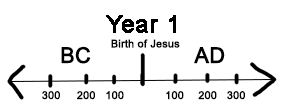giving an overview, from beginning to end. Knowing where the story is headed will give kids a better idea where the details fit in.
For example, when I teach Bible history I have the option of hundreds of different stories. If I start at the beginning and work my way through, my students will quickly get lost in the details. Instead, I break the entire Bible into six easy, yet central stories: Creation, Fall, Judgement (Flood), Promise (Abraham), Chosen People (Israelites), Cross (Jesus’ Sacrifice).
I strip these stories down to one or two simple details. I could literally tell each of these six stories in just a few sentences. This makes it easy for students to remember each story, and also to see how the stories fit together. The six stories then serve as bookends, and I simply go back and start filling in the gaps. I tell about Daniel and the Lions Den, and draw it back into the story of the Chosen People; I tell about Cain and Abel and point it to the Flood; I tie the Last Supper into the Story of the Cross. Teaching history this way keeps the stories connected.
2. Only Teach the Essential: If you are a mom who loves crafts, you may struggle with this one, but try to keep your content simple and relevant. If you are having your children dress up like turkeys to study the Pilgrims, you might be off track. The Pilgrims are not historical figures because they ate turkey!
3. Sequence, Not Dates: The order history unfolds is much more important than the actually dates (usually). If your history lessons become little more than the memorization of dates, your kids will learn to hate history. I’m not saying you can’t add dates, but again start with the basic elements of the story and then when your kids have mastered that, go back and sprinkle in the dates.
4. Explain BC and AD Early:
As soon as your kids are old enough to understand the concept, explain the difference between BC and AD. Be careful not to just say that BC is Before Christ and AD is after His death. This confused me as a kid until learning that AD started 30 years prior to Jesus’ death. Also, be sure to point out how BC dates count backward; in other words, 3000 BC comes before 1,000 BC.
 5. Don’t be biased: For the most part, the history
taught in government schools is full of lies, misrepresentations, and
half-truths. When I was in elementary school I lived in Lawrence,
Kansas. During the Civil War, Lawrence was burned to the ground by
southern Border Ruffians.
5. Don’t be biased: For the most part, the history
taught in government schools is full of lies, misrepresentations, and
half-truths. When I was in elementary school I lived in Lawrence,
Kansas. During the Civil War, Lawrence was burned to the ground by
southern Border Ruffians.The way I was taught it, the citizens of Lawrence were just sitting there singing kumbaya, when all of the suddenly those darn rebels burst into town on a murdering and raping spree. And I couldn’t help but think that all confederates were evil-murdering-rapists. In fact, many years later, I learned about the true “Jayhawkers” and the murderous raids that they ran in Missouri. In a town that loves its Jayhawks, it is no wonder they left that bit out.
It is in our nature to divide the history into a struggle of good versus evil, and paint everything either black or white. If our side commits atrocities they were justified; when the other guys do it, it’s always without cause. It is easy to fall into this type of deception. We often pick a side and then filter history accordingly, teaching only what we want to believe.
In most cases, history is a struggle between evil and evil; when we pretend otherwise, we champion propaganda, not history.
6. Use Real History: Whenever possible forgo the publishing houses’ textbooks, and use real historical words. Read works like The Bible, Herodotus’ Histories, Thucydides’ The History of the Peloponnesian War, Tacitus’ The Annals of Imperial Rome, and Caesar’s The Civil War. These books and others are real histories, and far more interesting than dry schoolhouse textbooks.
7. Not Every Old Story is History: History is an account of the events that dramatically changed the course of human destiny. What some ate, how they dressed, when they went to bed is closer to anthropology, than history. It does not matter how the Pilgrims dressed, what their boat was called, what time they went to bed, what their houses looked like, or what their favorite dessert was; these aren’t the reasons they are historical figures. We remember the Pilgrims, not for what they wore, but what they did, and more importantly, their impact.
8. Geography is the Canvas of History:
It is hard to understand history without a proper understanding of geography. You will read, “Hitler invaded the Rhineland,” but you won’t know where that was or why it was significant. The point is that geography allows us to visualize the events as they occurred. That is why at Blue Manor we begin teaching geography in kindergarten.
9. Retell the Story: Never quiz your children on history with essays or bubble sheets. History is a story and as such, it is best to have your children retell the story in their own words.
Source: http://www.trueaimeducation.com/how-to-homeschool-history-9-teaching-tips/







